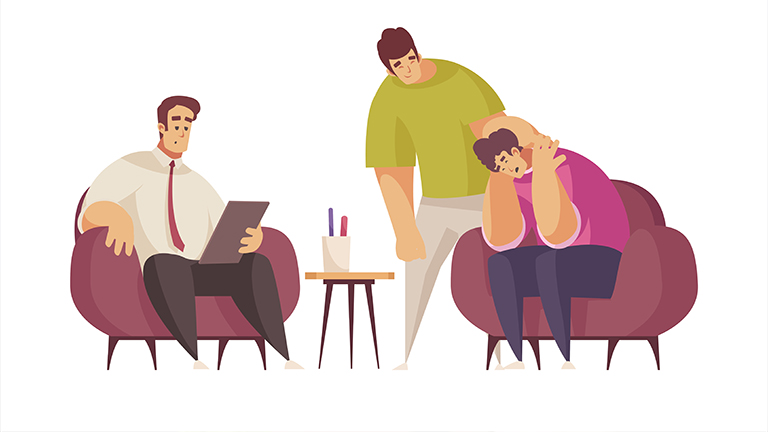Anxiety disorders affect millions of people worldwide, with symptoms ranging from persistent worry to debilitating panic attacks. While medication can provide relief, many experts agree that psychotherapy is best for anxiety in the long term. This article explores why psychotherapy—particularly evidence-based approaches like Cognitive Behavioral Therapy (CBT) for anxiety—is often the most effective treatment, its benefits over medication, and how to find the right therapist.
What Is Psychotherapy and How Does It Help Anxiety?
Psychotherapy, also known as talk therapy, involves working with a trained therapist to identify and change negative thought patterns, behaviors, and emotional responses. Unlike medication, which only masks symptoms, psychotherapy addresses the root causes of anxiety and provides long-term coping strategies.
Research shows that psychotherapy helps individuals:
- Understand their anxiety triggers
- Develop healthier thought patterns
- Learn relaxation techniques
- Build resilience against future stressors
Types of Psychotherapy Proven Best for Anxiety
Several psychotherapy techniques for anxiety have strong scientific backing. The best therapy for anxiety disorders depends on individual needs, but the most effective options include:
1. Cognitive Behavioral Therapy (CBT) for Anxiety
CBT is the gold standard for anxiety treatment, focusing on identifying and restructuring irrational thoughts that fuel anxiety. Techniques include:
- Cognitive restructuring (challenging negative thoughts)
- Behavioral activation (gradual exposure to feared situations)
- Mindfulness and relaxation training
Studies show CBT has a success rate of 60-80% for anxiety disorders, making it one of the most evidence-based anxiety treatments.
2. Exposure Therapy
Particularly effective for phobias, OCD, and PTSD, exposure therapy helps patients confront feared situations in a controlled setting. Over time, this reduces avoidance behaviors and desensitizes anxiety responses.
3. Acceptance and Commitment Therapy (ACT)
ACT teaches patients to accept anxious thoughts without resistance while committing to value-driven actions. This approach is especially helpful for generalized anxiety disorder (GAD).
Psychotherapy vs. Medication: Which Is Better for Anxiety?
While medications like SSRIs can provide quick relief, psychotherapy offers long-term benefits without dependency risks. Here’s a comparison:
| Factor | Psychotherapy | Medication |
| Effectiveness | Long-term relief | Short-term relief |
| Side Effects | Minimal | Possible weight gain, drowsiness |
| Relapse Rates | Lower | Higher (if discontinued) |
| Skill Building | Teaches coping strategies | Does not teach skills |
A Harvard Medical School study found that psychotherapy’s benefits last years after treatment ends, whereas medication effects often fade once stopped.
How Effective Is Psychotherapy for Anxiety Disorders?
Multiple studies confirm psychotherapy’s effectiveness:
- CBT reduces symptoms in 70% of panic disorder patients (APA)
- Exposure therapy helps 90% of specific phobia sufferers (NIMH)
- ACT improves emotional regulation in chronic anxiety cases (Journal of Consulting and Clinical Psychology)
Unlike self-help methods, structured psychotherapy provides personalized guidance, increasing success rates.
Key Benefits of Choosing Psychotherapy for Anxiety
1. Long-Term Coping Skills
Psychotherapy equips patients with lifelong tools to manage stress, preventing relapse.
2. Addressing Root Causes
Instead of just suppressing symptoms, therapy explores underlying trauma or thought patterns contributing to anxiety.
3. Minimal Side Effects
Unlike medications, psychotherapy has no physical side effects, making it a holistic approach to anxiety relief.
Who Should Consider Psychotherapy for Anxiety?
Psychotherapy is ideal for those who:
- Prefer non-drug treatments
- Want lasting solutions rather than temporary fixes
- Have mild to moderate anxiety (severe cases may need combined therapy + medication)
How to Find the Right Therapist for Anxiety Treatment
Choosing the right therapist is crucial. Look for:
- Licensed professionals (LCSW, PhD, PsyD)
- Specialization in anxiety disorders
- Experience with CBT, exposure therapy, or ACT
- Positive patient reviews
Websites like Psychology Today and BetterHelp offer therapist directories with filters for anxiety specialists.
Limitations and Alternatives to Psychotherapy
While psychotherapy is best for anxiety in most cases, it has limitations:
- Time-consuming (weeks to months of sessions)
- Cost barriers (though many insurers cover therapy)
- Not always enough for severe cases (may require medication)
Alternative treatments include:
- Mindfulness meditation
- Exercise and diet changes
- Support groups
FAQs About Psychotherapy for Anxiety
1. How long does psychotherapy take to work for anxiety?
Most patients see improvements in 6-12 sessions, but chronic anxiety may require longer treatment.
2. Can I do psychotherapy online?
Yes, teletherapy platforms like Talkspace and BetterHelp offer effective online CBT.
3. Is psychotherapy better than self-help books?
While books can help, personalized therapy has higher success rates due to tailored strategies.
4. Does insurance cover psychotherapy?
Most U.S., UK, and Canadian insurers cover psychotherapy for anxiety disorders.
Final Verdict: Is Psychotherapy the Best for Anxiety?
For most people, psychotherapy is the best long-term solution for anxiety. Unlike medication, it provides lasting skills, minimal side effects, and addresses root causes. While it requires commitment, the long-term benefits make it a top evidence-based choice for anxiety relief.
If you’re struggling with anxiety, consult a licensed therapist to explore the best psychotherapy approach for your needs.


